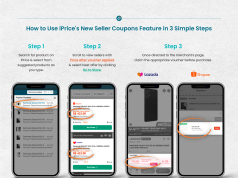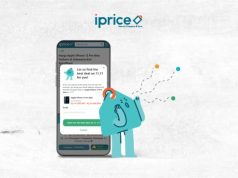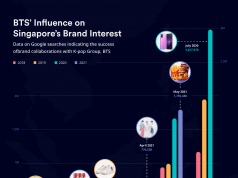With the US’ online sales skyrocketing due to the pandemic, it comes as no surprise that the Philippines’ e-Commerce industry is experiencing major changes in the past half-year as well.
iPrice Group’s Map of E-commerce report, in collaboration with App Annie and SimilarWeb, gives us in-depth insights on how Filipinos’ consumer behavior has shifted due to social distancing. Likewise, it gives us an idea of how the country’s multinational and local e-Commerce players are adapting, given the unexpected worldwide pandemic.
After comparing Q2 2020 with Q1 2020, App Annie’s data shows that the Philippines experienced the highest increase in the usage of shopping apps (53%) in Southeast Asia. The total sessions in shopping apps in the country reached 4.9 billion. It’s expected that e-Commerce players in countries that underwent strict social distancing measures experienced growth in mobile app usage/downloads, but it is still important to note the country’s hastened growth.
iPrice hypothesizes that the Philippines is now catching up to its Southeast Asian peers in terms of digital adaptations, especially since e-Commerce and digital services were not as accessible in the country. Brick-and-mortar stores still deemed to be more profitable. Given the country’s strict lockdown measures, however, the country’s economy is now forced to adapt.
This can also be seen in data from Statista, which shows that 44% of Filipinos aged 35-44 purchased more online during COVID-19. Moreover, iPrice’s previous study earlier this year also revealed that Filipinos were looking up Wifi Adapters 518% more as they gear up to spend more of their time online.
Though the Philippines may not be as savvy with e-Commerce as its other Southeast Asian peers like Indonesia or Singapore, its gradual adaptation is still pretty evident. Overall, Southeast Asians are spending more money online this year, comparing the first half of 2020 with the first half of 2019. The average basket size (amount added to an online cart) immensely increased in each country, but notably, the Philippines had the highest increase in basket size (57%) compared to its neighbors. In iPrice’s platform alone, Filipinos now spend about PHP 1,311/month on average.
iPrice also analyzed web traffic data from SimilarWeb, which sheds light on sites that are thriving/failing, product categories that are gaining demand, and how e-Commerce players are adapting to the unexpected pandemic. Here are the most interesting insights:
- Fashion retail sites are falling out of favor. Fashion e-Commerce sites have taken the biggest hit regionwide as clothing and apparel become less of a priority while people are staying home. Each country’s fashion websites recorded by iPrice and SimilarWeb have experienced a collective decrease in web traffic.
- In the Philippines, fashion sites’ web traffic collectively decreased by 30% compared to last year’s, while electronics sites increased by a glaring 59%. This proves Filipinos’ increased demand for gadgets during social distancing. Compared to other SEA countries, the Philippines had the highest web traffic increase in electronics sites. In fact, e-sites in other countries (except Singapore) even experienced a decrease in web traffic.
- Sports/outdoor products are the most ordered in Southeast Asia. Out of all the other categories, sports and outdoor products obtained the highest growth in average orders, which reached an increase of 34% compared to last year. The average amount spent on these products is US$ 28 (Php 1,361). With restrictions imposed on outdoor/sports activities, it’s a given that consumers are adapting.
- With the unexpected virus reshaping these consumer trends, e-Commerce players switch up their 2020 promotional strategies to adapt to the situation. E-Commerce giants like Lazada PH and Shopee PH had bountiful free-shipping promos across the year. They added a number of promos on essential goods too. Meanwhile, local player Beauty MNL offered numerous discounts/promos on vitamins and supplements.
- With the rising trend of online shopping in the country, the Philippines’ Internet economy may just be getting the push it needs. The Philippines is known to survive with cash-based transactions and brick-and-mortar stores, but perhaps its inevitable adaptation to COVID-19 will allow the country’s digital world to catch up to its more developed Southeast Asian neighbors. E-Commerce players then now have a responsibility to keep encouraging this rising trend, while emerging local merchants are now presented with more potential opportunities.
Methodology
All data on the total visits on desktop & mobile web in this study were taken from global traffic figures from the respective websites as of June 2020 from SimilarWeb. The following industries were not included in this list: e-ticketing, financial services, rental services, insurance, delivery service, food & beverage, meta-search, couponing, cashback websites & e-commerce who solely provides classified ads/P2P services. SimilarWeb introduced a major algorithm update on September 2019 which affected the total visits recorded by all websites for 2019. The number of sessions in a quarter based on quarterly sessions on Android Shopping Apps.
About SimilarWeb
As the most trusted platform for measuring online behavior, millions of people rely on SimilarWeb insights daily as the ground truth for their knowledge of the digital world. They empower anyone — from the curious individual to the enterprise business leader — to make smarter decisions by understanding why things happen across the digital ecosystem. All data on the total visits on desktop & mobile web in this study were taken from global traffic figures from the respective websites as of January 2020 from SimilarWeb.
About App Annie
App Annie is the industry’s most trusted mobile data and analytics platform. App Annie’s mission to help customers create winning mobile experiences and achieve excellence. The company created the mobile app data market and is committed to delivering the industry’s most complete mobile performance offering. More than 1,100 enterprise clients and 1 million registered users across the globe and spanning all industries rely on App Annie as the standard to revolutionize their mobile business. The company is headquartered in San Francisco with 12 offices worldwide.
About iPrice Group
iPrice Group is a meta-search website operating in seven countries across Southeast Asia namely; Malaysia, Singapore, Indonesia, Thailand, Philippines, Vietnam, and Hong Kong. Currently, iPrice compares and catalogues more than 5 billion and receives about 20-30 million monthly visits across the region. iPrice currently operates three business lines: price comparison for electronics and health & beauty; product discovery for fashion and home & living; and coupons across all verticals.












